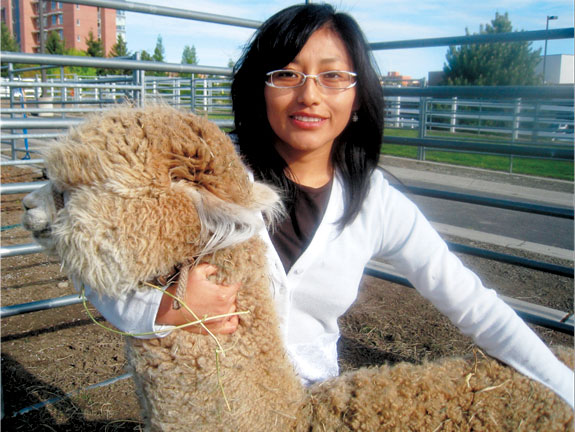Yessenia Picha ’12 comes from a family of alpaqueros, or alpaca ranchers. She grew up around the curious, long-lashed creatures raised mostly for the fiber made from their soft, durable fleeces. With 80 percent of the world’s alpaca population residing in Peru, it’s no surprise that after completing her veterinary degree at the Catholic University of Santa Maria, she worked for an agricultural social services agency in the area of genetic improvement of the animal.
While the work was rewarding, “I felt there were important gaps in my knowledge,” says Picha. She knew she could obtain more rigorous veterinary training in the United States. Also, in Peru veterinary medicine is considered a man’s job, especially when it comes to working with large animals like alpacas and cattle, she says. “I came to see that I would have to study harder and work harder to show that I can make a difference.”

Five years ago Picha came to Pullman for a three-month visit to study under Ahmed Tibary, a professor in the College of Veterinary Medicine who specializes in animal reproduction and is known around the world for his work with camelids, members of the biological family that includes camels, alpacas, and llamas. Tibary and his colleagues were the type of experts Picha longed to work with, she says, adding that she also appreciated the school’s philosophy of respect toward animals. What’s more, WSU had its own herd of alpacas.
“At home, alpacas don’t like people much because we view them more as business subjects and don’t show them much affection. They ignore us and spit on us,” she says. In Pullman, she found a different experience. “Here, they seem kind and smart,” she says. “I think, because they are treated with more affection.”
Recognizing Picha’s desire to continue her education, Mushtaq Memon, an associate professor of comparative animal reproduction at WSU, encouraged her to apply for a Fulbright scholarship so she could return to WSU and complete her master’s degree. Not only did the competitive international program award her a grant for her studies, it provided for intensive English language training.
“When she first got here, she spoke in broken English and seemed unsure of herself,” says Memon, himself a Fulbright scholar who now serves as WSU’s Fulbright Ambassador. “But she was curious, determined, and worked hard. During her two years here, she learned, grew, and gained confidence. And yet, she never lost sight of where she came from and her commitment to contribute what she learns when she goes back.” Late this summer Picha returns to Cuzco as one of the first, if not the first woman veterinarian in Peru to earn a veterinary master’s degree in the United States.
Picha hopes to work mainly with alpacas and cattle and would like to eventually return to school and earn her doctorate. Someday she hopes to join the faculty at a university. “I hope to teach my students to be critical thinkers. Before, I didn’t question what I learned from my books or my professors,” she says. “Here, I was encouraged to ask, ‘Why?’”
And whenever she sees someone wrestling with an alpaca—the economic mainstay of many Peruvian villages—she’ll draw on her Pullman experience. “I’ll tell them, alpacas can help you,” she says. “You don’t need to have a fight with them. Here, let me show you…”
